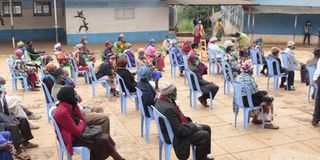Premium
Expand social protection to cushion vulnerable groups of post-Covid-19

Some of the beneficiaries of the Inua Jamii programme in Meru.
What you need to know:
- Since the virus struck in the country mid-March, many lives have been shattered.
- Oxfam in Kenya, working in partnership with a coalition of six NGOs, is running a social protection programme that provides about 120,000 residents of informal settlements in Nairobi and Mombasa with monthly mobile cash transfers.
- The project should be expanded and spread across the country to cushion vulnerable Kenyans.
If there is anything that has brought out our vulnerability as a society, it’s the Covid-19 pandemic. The horrid coronavirus has also exposed us collectively and as individuals, bringing out the best and the worst in us. However, the best must, and should, continue to prevail over the worst as we battle the disease, which has so far claimed some 650 lives of our compatriots.
Since the virus struck in the country mid-March, many lives have been shattered — not by Covid-19 per se, but also by its effects, from lost livelihoods to a spike in sexual and gender-based violence (SGBV), with mainly women and girls on the receiving end.
Sadly, as a result of the SGBV and related criminality, a big number of girls may not go back to class when schools reopen because of pregnancy as they face an uncertain future, given that they are still minors.
Disadvantaged families
Dozens of the hardest-hit by the Covid-19-instigated crisis are families in informal settlements, mostly in Nairobi and Mombasa, who live from hand to mouth, as well as households headed by single women.
SGBV is also predominant in these settlements, and cases have spiked during the Covid-19 pandemic with more women and girls than men at risk. They are among the hundreds of disadvantaged families in poor settlements who find themselves lacking means of livelihood, thanks to the pandemic.
This was exacerbated immediately after the government imposed containment measures — including partial lockdown — to curb the spread of the virus.
As soon as the containment measures started, individuals and groups of desperate women sitting by the roadside and at specific spaces close to Nairobi’s leafy and not-so-leafy suburbs in search of domestic work became, and still are, a common sight. Most of them lost their jobs when their employers retreated to their homes, shutting out their domestic workers, particularly those who commute, amid coronavirus fears.
Six months later, the situation hasn’t changed much and vulnerable Kenyans continue to suffer from the adverse effects of the virus.
However, there are groups and individuals who have gone all out to see the vulnerable and their families through the Covid-19 crisis. It’s important that we encourage, appreciate and support their work to make the lives of the vulnerable among us bearable.
Among these is Oxfam in Kenya — a development and humanitarian organisation — which, working in partnership with a coalition of six NGOs, is running a social protection programme that provides about 120,000 residents of informal settlements in Nairobi and Mombasa, with safety nets in form of monthly cash transfers. These organisations include Kenya Red Cross Society, Concern Worldwide, ACTED, IMPACT Initiatives, Centre for Rights Education and Awareness (CREAW Kenya) and the Wangu Kanja Foundation.
Beneficiaries of the European Union and the Danish (Danida) and German (GFFO) governments project comprise households that lost their means of livelihood during Covid-19 and cannot afford basic needs like food and sanitation and are at risk of SGBV. The fact that it also targets the elderly, persons with disabilities and the chronically ill as well as pregnant or lactating mothers is laudable and commendable.
It is important that both levels of government seriously address the issue of SGBV, whose continued upsurge raises questions of whether there is sufficient will to deal with it.
There are also challenges like poverty that afflict vulnerable groups, particularly women living in informal settlements. In addressing them, the two levels of government should come up with comprehensive social protection programmes similar to Oxfam’s.
The project should be expanded and spread across the country to cushion vulnerable Kenyans. While acknowledging the Ministry of Labour and Social Protection-run Inua Jamii programme, the government should implement similar programmes whose existence has remained on paper.
This, given that Inua Jamii gives a monthly cash support of Sh2,000 to the target 11,250 households in Nairobi informal settlements, and the consortium of Oxfam and the six NGOs provides a top up of Sh5,668 to the government programme's beneficiaries to make it a total of Sh7,668.
This, without a doubt has come in handy to these vulnerable Kenyans who are among the hardest hit by the current economic hardships instigated by Covid-19.
Notably however, Inua Jamii does not target SGBV survivors, pregnant women or specifically women headed households. It would be important and critical that it expands to also include support for that vulnerable category particularly survivors of SGBV and those at risk because they require all the support to help through the trauma and Covid-19 difficulties.
Ms Rugene is a consulting editor and founder, The Woman’s Newsroom Foundation. [email protected].





